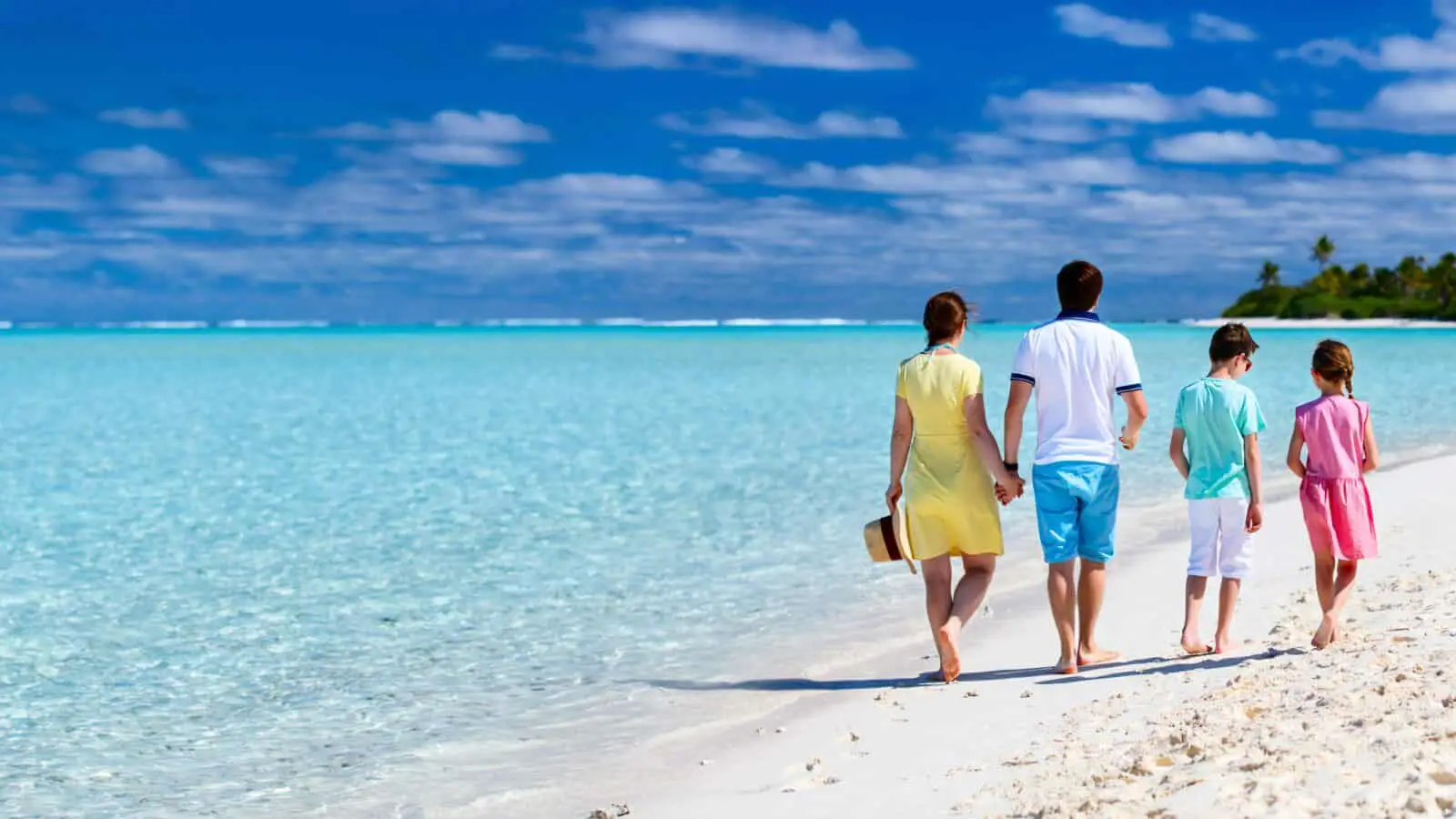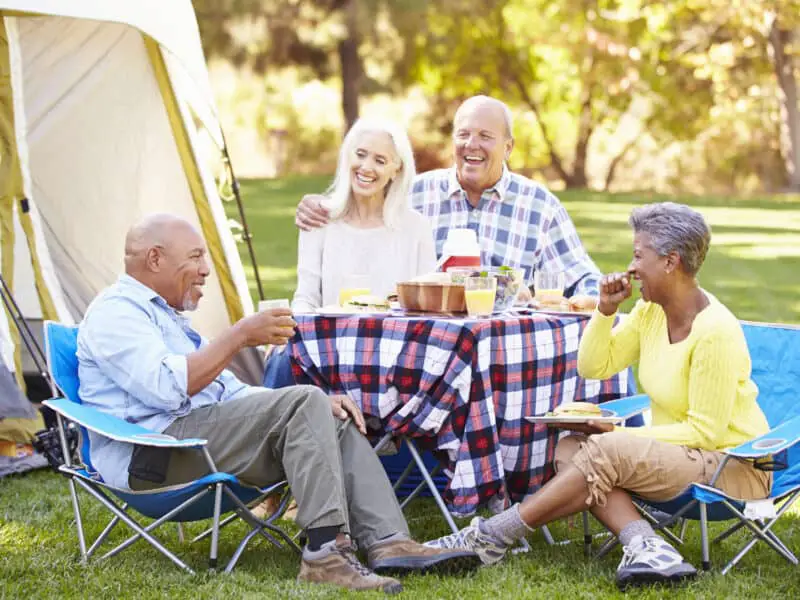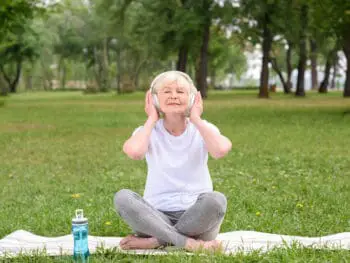There’s no better way to get back to nature than camping. You get to relax and enjoy the great outdoors without interruptions. For most of us, you’ve probably experienced a great camping trip at least once in your lifetime.
Unfortunately, not everyone can say the same. Time flies and before you know it, conquering the great outdoors seems like something only youngsters can do. As such, camping for seniors and older people might seem more daunting the more you wait.
The good news is that camping is an activity that people of all ages can enjoy. But as most senior citizens will tell you, camping tends to change a bit as the years advance. Your knees become sore, everything gets heavier and fun is now simply sitting down and staring up at the night sky.
With the right planning, it doesn’t have to be this way. So whether you’re thinking of going on a solo adventure or take a break with your friends and family, we’ve laid down a few recommendations that will help seniors enjoy every single minute of their camping trip.
1. Have a practice run
They say failing to plan is planning to fail. If you haven’t been camping in a while, there’s nothing wrong with being prepared. So why not practice pitching your tent and sleeping outside if you have a large enough outdoor space?
Not only will this let you know if the tent is in good condition, you’ll also gauge the height of the tent to see if you can walk around inside without having to bend your back.
The practice run will also let you know if you’re capable of pitching the tent and taking it down after. Sure, modern tents are super easy to set up. But a few nuances can still prove tricky, especially if you suffer from joint aches or arthritis.
It’s always wise to give it a test run to avoid unnecessary and stressful situations once you arrive at the campsite.
2. Comfort is king
One common misconception people have with camping is that you have to sleep on an uncomfortable surface.
Sure, roughing it might have had some appeal when you’re young, but the last thing older adults want is to wake up feeling like they’ve been run over by a truck the previous night. Therefore, sleeping comfortably might just be the most important tip.
Older campers might find things like getting in and out of bed problematic – especially those with chronic back pain. The lower your camping bed is, the more painful and difficult it will be when you try to wake up in the morning. The lower center of gravity definitely doesn’t make things any easier.
That’s why you want a bed that sits a tad high off the ground. When it comes to camping beds, there are three solid options.
A camping cot, a camping hammock, or an air matresss with an airbed on a frame. The third option is the best because it elevates senior campers to a height that is similar to your average bed. This makes getting in and out of bed a super simple task.
What’s more, the support from the frame and the elevated air mattress not being in contact with the ground means you won’t lose heat while sleeping. If you choose to put your air mattress directly on the ground, the lack of insulation might mean lost heat leaving your mattress a cold, air filled sleeping surface.
Another important tip to note here is to get a mattress that can self-inflate. The last thing you want is to have to work a pump manually every time you want to get some shuteye. Self-inflating airbeds will take the work out of comfort and make your camping trip that much easier.
3. Pack the right tent
The aim of camping is to live and sleep comfortably all through your trip. This is why choosing a good tent is of the utmost importance. Now, don’t go for the tent you stowed in the dusty attic ten years ago because it may differ slightly from the one you need right now.
When shopping for a tent specifically suited for senior campers, there are three main aspects to keep an eye out for. These include height, living space, and of course, how daunting it is to pitch.
Our advice is to invest in a spacious stand up tent. In addition to making it easier to stow a suitable air mattress and frame, the extra standing room also lets older campers move around without awkwardly crouching or crawling.
A lot of medium going on large tunnel tents give solid standing height. Similarly, 5m high bell tents heights and upwards will work nicely even though they might be a bit harder to set up. However, their doors are tall so you don’t have to bend when you go in and out.
If you can get a tent with a segmented living space from the bedroom, this will really come in handy. You can relax in your makeshift living area/kitchen when it’s super cold to sit or eat outside. The living area will give you more storage space since the bedroom is usually already cluttered. You can use plastic boxes or baskets to keep all food and drinks neatly stashed away. If everything is organized, you won’t have any trip-hazards, especially at night when you can’t see well.
The best way to make sure you know what you’re getting is to buy your tent in-store as opposed to online. This will allow you to gauge its level of difficulty. You want a tent that is easy to pitch and unpitch and there’s no better way to get a feel than doing it at the store with the help of an assistant.
So basically, elderly campers will need a tent that is adequately tall to stand up in and easy to set and take apart. However, it also pays to get one with multiple rooms such as bedroom and living space.
Double-layered protection will also come in handy if you’re expecting rain during your trip. And finally, heavy duty zippers will add resilience while guy ropes that glow at night let you view your surroundings at night.
4. Research campsites beforehand
Before you decide on where you want to go, you might want to look into several campsites first. Read reviews from different campsites to see what others had to say. If older campers had positive things to say about the campsite, then this is an excellent sign.
However, you’ll soon find out whether senior campers liked the place or not since their reviews tent to be quite detailed and honest. Juts take your sweet time and find an appealing campsite that you can really enjoy staying at. Of course, toilets and access to power are a must. It also helps if the campsite offers a lot of appealing amenities.
5. Pack your bags carefully
When packing for your camping trip, you need to be extra cautious. You should make sure you bring all your items for the trip. So, what need to be in your ruck sack?
Obviously, the most important thing you can bring is water. It’s of the utmost importance to keep hydrated during the trip.
Similarly, you want to load up on the right type of food to provide nourishment all through the trip. If you don’t have a portable fridge with you, foods that do not need to be refrigerated are best.
You also don’t want to forget a number of protective items. See, as people age, their skin becomes far more susceptible to the elements. That’s why you ought to pack sunglasses, a hat, and sunscreen.
Bugs and other insects can also cause lots of problems to older campers. So pack that bug spray as well as a secondary mosquito protection system to keep the bugs at bay.
The best way to guarantee you never forget anything is to make a list of things you want to take on your camping trip. Go over the list carefully and make sure you haven’t forgotten any of the critical items. Failure to bring the things you need could lead to a very uncomfortable and unsafe camping trip.
Oh, one more thing that people forget is to take any medication you might have. If you got a prescription, bring it along with any medication you take along with you. This way, you can head to a nearby pharmacy and refill the prescription if you lose any meds.
Medication is one thing you definitely don’t want to leave behind. Failure to take your meds could lead to health issues. Just make sure that if you do bring your medication, place it somewhere easy to reach.
6. Keep warm and toasty
Suffice it to say that days and night can get really cold, even during the summer season. And since seniors might not be the most active people, the cold really tends to get to them. That’s why keeping warm is crucial to any camping trip. Fortunately, this can be achieved simply by packing relevant items.
Bringing a metric ton (not mathematically accurate) pillows and blankets is a must. Even with the best air mattress, you’ll still need some additional protection to stay comfortable all through the night. Our advice is that you try to stay toasty during the night since evening temperatures can drop very low even when seated around your campfire.
Invest in heavy woolen blankets to remain toasty. However, be super careful around campfires. No matter what type of blanket you have, the sparks might jump and land on the fleece creating a fire hazard.
Another tip to keep warm during your camping trip is to ensure every zip and entrance is properly done. Not only will this prevent unwanted drafts, it will also prevent heat from escaping.
Another great idea is laying down a plush camping rug on the ground to keep the feet warm and insulate your tent even at the bottom. Our advice is to make sure you use cushions, blankets and rugs to make your tent sort of like a home away from home. Don’t be shy to pack loads of homely things to build the perfect lounging space.
Similarly, make sure you bring hot bottles and a heat pads if you get cold real fast. And if you have joint pains, keeping warm is essential. Make sure you also bring kettles for the water bottle and sticky heating packs that help immensely when camping in cool weather.
Additional tips for staying warm as a senior camper include packing warmer layers of clothes and using a thick sleeping bag.
7. Check the weather
As obvious as it may sound, it’s important to check the weather forecast before embarking on your camping trip. Forecasts can change from sunshine to rain at the very last minute influencing what you need to pack for the trip. If it’s going to be overly sunny, you may want to pack a picnic basket and some beach gear. Otherwise, bring lots of waterproof clothing if you’re expecting rain.
Our advice is to check the weather forecast for the next few days before camping so as to adjust accordingly. Low temperatures will require better and more costly equipment such as blankets and sleeping bags.
But while heavy rains could ruin the experience altogether, a heatwave without proper shade will make you miss your AC. Be prepared for all weather eventualities and ensure your tent is equipped for sun, wind, and rain.
8. Show caution when building campfires
Did you know that a lot of camping accidents are closely related to campfires? For this reason, you need to be extra careful when building your campfire. As opposed to setting up an open fire, all campfires need to be built in a designated area. The recommended space here is a 10 foot diameter around a fire pit.
Likewise, always make sure you have an easy way to put out the fire at the end of the night so it doesn’t burn all through till morning. You should also avoid sitting extremely close to the fire since you could wind up getting burnt by the embers.
Sure, a campfire is one of the best ways to indulge in hearty meals if you have a grill or cast iron oven. In addition to offering warmth, it’s a great place for a sing along or scary ghost stories. Just remember all the dangers fires pose and stay safe.
9. Notify friends and family of your trip
As a senior camper, you want to make sure that you get all the help you need if anything goes wrong during the trip. That’s why you should talk to your friends, family members, and even the doctor about it. Let everyone know exactly where you are going to be beforehand.
You also want to make sure you check in with a loved one at designated times, especially if you are camping alone. If you don’t get any phone service at the campsite, check whether there’s a separate phone you can use to let people know that you are safe, sound, and having a blast.
10. Bring something to do
Ah, to be young again. When you’re a spry young lad, you can literally spend all week biking, swimming, hiking, canoeing and other fun activities.
As you get older, the range of activities you can do significantly gets shorter. In addition to not being able to keep up with ardous tasks, you’ll find that you might need to take a rest more often than you did in the past. Never fret, this is perfectly fine and there’s nothing to worry about.
The only downside is that you might find yourself with a bit more downtime than you bargained for. Naturally, this leads to boredom and a dragged out trip.
Fortunately, you can avoid this by packing a few leisure activities for the trip. Why not catch up with your favorite series or read a good book. You could even pick up a new skill such as whittling or carving with wood.
Not only will these activities keep you entertained, they’ll also help sharpen both new and old skills. You can even choose a few to do when it’s raining outside so you don’t get bored in the tent.
The Final Word
Never let old age keep you from enjoying the activities you love. If you’re a senior citizen and love camping, you shouldn’t let anything keep you from enjoying the great outdoors. Well, what about anyone who has never camped before?
If you’ve never had the pleasure of being one with nature, add it to your bucket list today and just do it. With this guide and all the camping tips we’ve laid out above, you can expect a very fun, safe, enjoyable and comfortable camping trip.
Either way, you’re guaranteed a great time outside. What’s more, you’ll have a killer tale to tell your grandkids when you return victorious from conquering nature.













 Natural Products To Help With Skin Breakouts And Acne Scars!
Natural Products To Help With Skin Breakouts And Acne Scars!